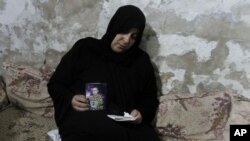A United Nations agency says the long-term prospects for economic development in the Palestinian territories have worsened. In its annual report on Assistance to the Palestinian People, the U.N. Conference on Trade and Development warns growth achieved in 2011 and through early 2012 is not sustainable.
The economy of the West Bank, Gaza, and East Jerusalem grew by 9.9 percent last year.
This sounds good. But UNCTAD - the U.N. Conference on Trade and Development - cautions against misconstruing this result.
Indeed, the agency's coordinator for assistance to the Palestinians, Mahmoud Elkhafif, calls this growth rate an illusion because it mainly originates in the Gaza Strip.
“Gaza experienced a destructive war in December 2008 and January 2009," he says."The growth in Gaza is coming because rehabilitating some of the destroyed infrastructure. So, once rebuilding has been done, this source of growth is no longer available. The growth in the West Bank actually is five percent, four percent and also is donor driven, by the way. So, the source of growth that we have seen last year is not sustainable.”
The report paints a grim picture of the economic situation in the Palestinian territories. It says unemployment persists at 26 percent, along with severe poverty and chronic food insecurity. It says conditions are particularly alarming for Palestinians in East Jerusalem, where the poverty rate is estimated at 78 percent higher than the rates in the West Bank and Gaza.
The report says Palestinian development problems have less to do with the Palestinian Authority’s economic policy than with what it calls Israeli occupation.
It says the Israeli economic controls have almost eliminated all domestic and external marketing and investment opportunities, and has eroded the land and natural resources available to Palestinians for economically productive activities.
Economist Elkhafif says a main problem standing in the way of development is Palestinian economic dependence on Israel. He says Palestinian trade suffers from a chronic deficit.
“The trade deficit is about 36 percent of GDP, that is $3.2 billion," says Elkhafif. "About more than 80 percent of this deficit is because of trade with Israel. And, that is another reason why this growth is not sustainable because this growth is attached to development in trade and development in trade is more or less controlled by Israel.”
The report says years of occupation have rendered Palestinian agriculture incapable of realizing its productive and employment potential. It says the agricultural sector’s share of Gross Domestic Product has shrunk from 12 percent in 1995 to 5.5 percent in 2011.
Though Palestinian agriculture is operating at one-quarter of its potential, UNCTAD economists say the sector is resilient and could bounce back. The U.N. agency says the donor community and the Palestinian Authority have neglected this sector and recommends they take corrective measures to compensate.
The U.N. report says an agricultural development bank should be established to provide credit and insurance. It says the bank should support marketing and post-harvest services, as well as funding and guaranteeing investment in agricultural and water infrastructure.
The economy of the West Bank, Gaza, and East Jerusalem grew by 9.9 percent last year.
This sounds good. But UNCTAD - the U.N. Conference on Trade and Development - cautions against misconstruing this result.
Indeed, the agency's coordinator for assistance to the Palestinians, Mahmoud Elkhafif, calls this growth rate an illusion because it mainly originates in the Gaza Strip.
“Gaza experienced a destructive war in December 2008 and January 2009," he says."The growth in Gaza is coming because rehabilitating some of the destroyed infrastructure. So, once rebuilding has been done, this source of growth is no longer available. The growth in the West Bank actually is five percent, four percent and also is donor driven, by the way. So, the source of growth that we have seen last year is not sustainable.”
The report paints a grim picture of the economic situation in the Palestinian territories. It says unemployment persists at 26 percent, along with severe poverty and chronic food insecurity. It says conditions are particularly alarming for Palestinians in East Jerusalem, where the poverty rate is estimated at 78 percent higher than the rates in the West Bank and Gaza.
The report says Palestinian development problems have less to do with the Palestinian Authority’s economic policy than with what it calls Israeli occupation.
It says the Israeli economic controls have almost eliminated all domestic and external marketing and investment opportunities, and has eroded the land and natural resources available to Palestinians for economically productive activities.
Economist Elkhafif says a main problem standing in the way of development is Palestinian economic dependence on Israel. He says Palestinian trade suffers from a chronic deficit.
“The trade deficit is about 36 percent of GDP, that is $3.2 billion," says Elkhafif. "About more than 80 percent of this deficit is because of trade with Israel. And, that is another reason why this growth is not sustainable because this growth is attached to development in trade and development in trade is more or less controlled by Israel.”
The report says years of occupation have rendered Palestinian agriculture incapable of realizing its productive and employment potential. It says the agricultural sector’s share of Gross Domestic Product has shrunk from 12 percent in 1995 to 5.5 percent in 2011.
Though Palestinian agriculture is operating at one-quarter of its potential, UNCTAD economists say the sector is resilient and could bounce back. The U.N. agency says the donor community and the Palestinian Authority have neglected this sector and recommends they take corrective measures to compensate.
The U.N. report says an agricultural development bank should be established to provide credit and insurance. It says the bank should support marketing and post-harvest services, as well as funding and guaranteeing investment in agricultural and water infrastructure.











